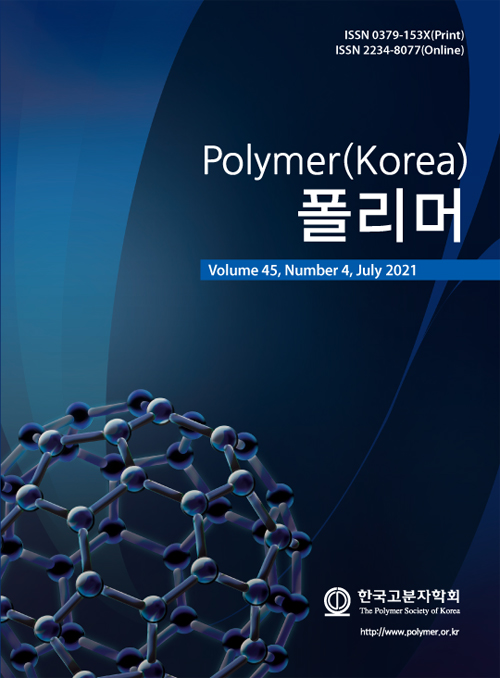- Castor Oil and HER Based Polyurethanes: Synthesis, Characterization and Structure-Thermal Stability Relation
Thangamani Rajkumar†
 , Venugopalan Rajasudha*, Arunjunai Raj Mahendran**, and Chinnaswamy Thangavel Vijayakumar***
, Venugopalan Rajasudha*, Arunjunai Raj Mahendran**, and Chinnaswamy Thangavel Vijayakumar***Department of Chemistry, Rajah Serfoji Government College (Affiliated to Bharathidasan University), Thanjavur - 613005, Tamilnadu, India
*Department of Chemistry, Bon Secours College for Women, Thanjavur - 613006, Tamilnadu, India
**Wood K Plus-Competence Center for Wood Composites and Wood Chemistry, Altenberger Strasse 69, A-4040 Linz, Austria
***Department of Polymer Technology, Kamaraj College of Engg. & Tech., S.P.G.C. Nagar,
K. Vellakulam Post - 625701, Tamilnadu, India- Castor 오일과 HER 기반 폴리우레탄: 합성, 분석, 구조-열 안정성 상관관계
Reproduction, stored in a retrieval system, or transmitted in any form of any part of this publication is permitted only by written permission from the Polymer Society of Korea.
Polyurethanes (PUs) were prepared from solvent and catalyst free reaction mixture containing polyethylene glycol (PEG), 4,4’-methylene diphenyl diisocyanate (MDI) and 1,3-bis(2-hydroxyethoxy) benzene (HER) and/or castor oil (CAO). PUs were characterized using the Fourier-transform infrared spectroscopy (FTIR) and proton nuclear magnetic resonance (1H NMR) spectroscopic methods. Thermal studies on PUs using differential scanning calorimetric (DSC) and thermogravimetric analysis coupled with FTIR (TG/FTIR) proved that CAO-extended PUs were thermally more stable than HER extended PUs. The partial and complete replacement of HER content in PUs using CAO enhanced the thermal stability by shifting degradation temperature to higher temperature (5-15 °C) and enhancing the char residue. The parameters derived from DSC traces, thermogram and differential thermogram confirmed that PUs synthesized using PEG 1500 are thermally more stable than the PUs prepared using PEG 4000. The probable degradation mechanism to study the role of β-hydrogen on the thermal stability was proposed and discussed based on the results of TG/FTIR.
Keywords: β-hydrogen, mechanism, polyurethane, synthesis, thermal degradation.
- Polymer(Korea) 폴리머
- Frequency : Bimonthly(odd)
ISSN 0379-153X(Print)
ISSN 2234-8077(Online)
Abbr. Polym. Korea - 2023 Impact Factor : 0.4
- Indexed in SCIE
 This Article
This Article
-
2021; 45(4): 511-519
Published online Jul 25, 2021
- 10.7317/pk.2021.45.4.511
- Received on Jan 11, 2021
- Revised on Apr 17, 2021
- Accepted on Apr 22, 2021
 Correspondence to
Correspondence to
- Thangamani Rajkumar
-
Department of Chemistry, Rajah Serfoji Government College (Affiliated to Bharathidasan University), Thanjavur - 613005, Tamilnadu, India
- E-mail: rajkumar_t@rsgc.ac.in








 Copyright(c) The Polymer Society of Korea. All right reserved.
Copyright(c) The Polymer Society of Korea. All right reserved.